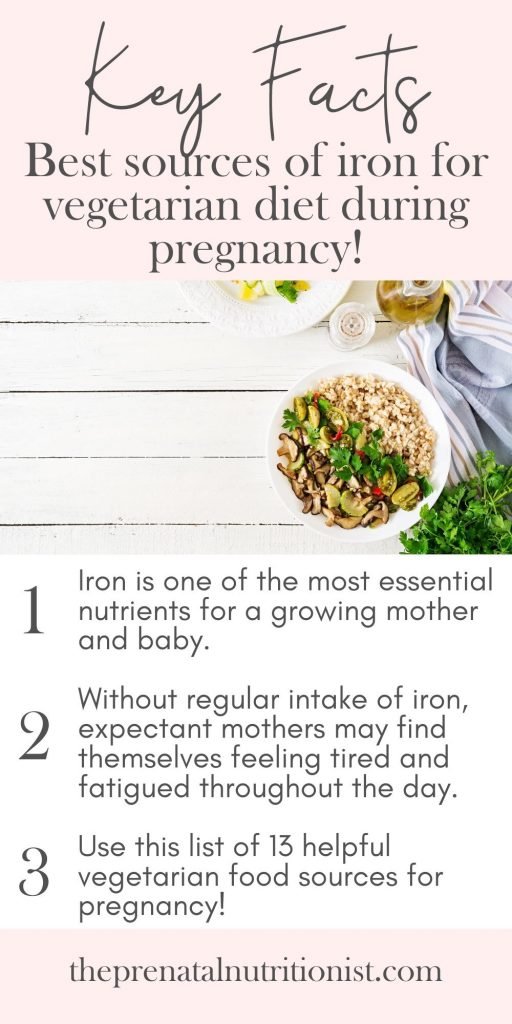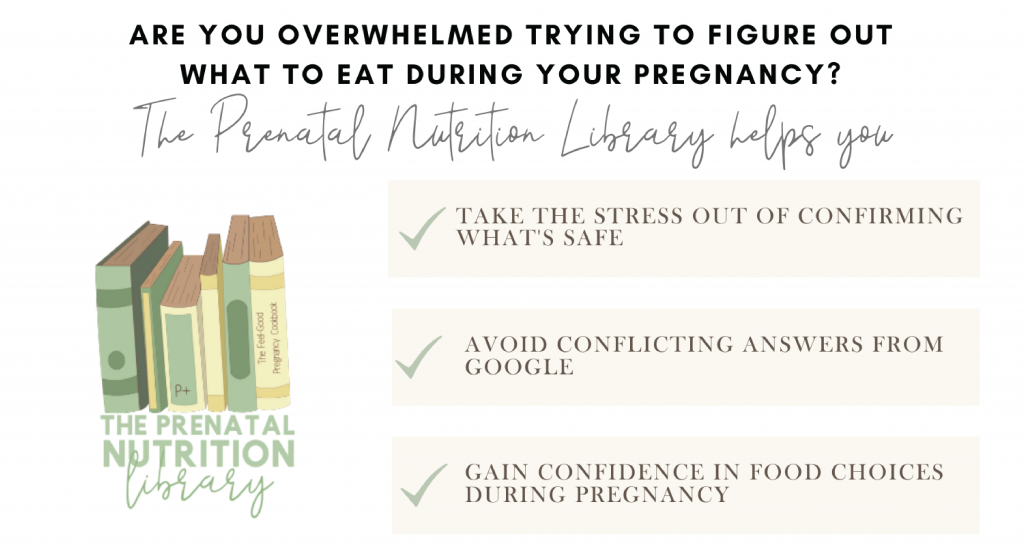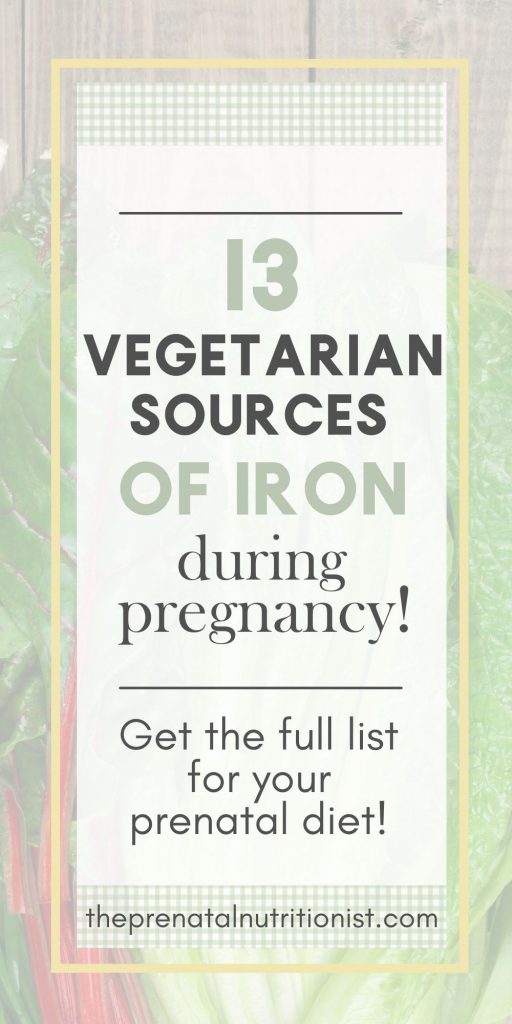
During pregnancy, iron is a very crucial nutrient for both the mother and the growing baby. During pregnancy, your blood supply increases by about 50% to transport nutrients and oxygen to your baby and all the tissues in your body. Without an adequate intake of iron, expectant mothers may find themselves feeling extra tired and fatigued throughout the day. And, in more serious cases, lack of iron can lead to iron deficiency, iron-deficiency anemia, or other pregnancy complications.
The body does not naturally produce this essential nutrient. It must be obtained from foods and supplementation as needed. You may or may not need a supplement with iron during pregnancy.
The Recommended Dietary Allowance (RDA) for pregnant women is 27 milligrams (mg) of iron each and every day. This is a big jump up from the RDA of 18 mg per day outside of pregnancy. Besides promoting the proper production and creation of red blood cells, iron is also important for strengthening the immune system, moving oxygen throughout the body, and supporting the baby’s brain development.
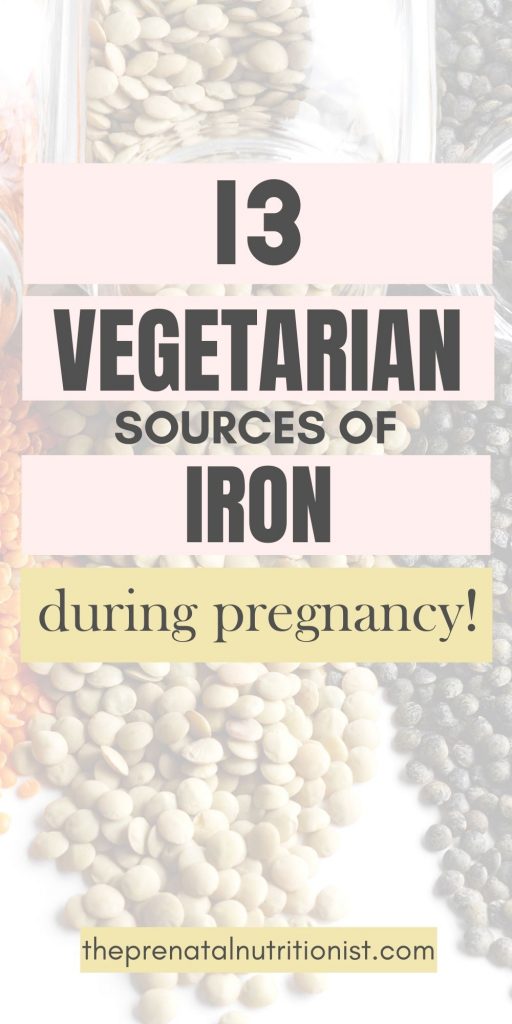
13 Vegetarian Sources Of Iron During Pregnancy
So, how can you make sure you’re getting plenty of iron throughout your pregnancy?
The key is to be proactive and to build up those iron stores early. There are two types of iron, non-heme iron and heme iron. Heme iron is found in animal foods like beef and chicken and is absorbed at a much higher rate than non-heme iron. Non-heme iron is found in plant foods. I recommend including both in your diet. Pairing non-heme iron sources with vitamin C-rich foods will help improve absorption.
There is a multitude of vegetarian food sources of iron to choose from for your pregnancy. It is important to note that some research suggests if you do not include any sources of heme-iron (i.e. meat and fish) in your diet you may need to consume above the RDA (27 mg of iron) each day to adequately meet your needs.
Let’s take a look at a variety of vegetarian sources of iron that can help ensure a happy and healthy pregnancy!
Dark leafy greens
Dark leafy greens such as spinach, kale, and collards are a rich source of non-heme iron. When cooked, just one cup of these greens can contain anywhere between 2.5 mg to 6.5 mg of iron. These greens are also an excellent source of other essential nutrients required during pregnancy!
These include, but are not limited to, vitamins A, C, and K, fiber, folate, calcium, and potassium.
Mushrooms
Certain varieties of mushrooms are good sources of iron and can contain up to 20% of the recommended daily value of this nutrient. These varieties include White Button, Oyster, Straw, and Chanterelles. Other varieties, like portobello, contain very little iron. And yes, most mushrooms you find in grocery stores are safe to eat during pregnancy and provide plenty of other benefits, too.
Tofu
Tofu is an excellent source of iron. Especially for vegetarians and vegans. Just a ½ cup of tofu contains a whopping 6.6 mg of iron in addition to a plethora of other essential nutrients. A breakfast tofu scramble with vegetables or a tofu taco bowl both taste delicious.
Lentils
These legumes are a great source of non-heme iron and the perfect addition to a meal on a cold winter day. A single cup of cooked lentils contains over 6 mg of iron as well as 18 grams of protein (yay!) and 16 grams of dietary fiber (amazing!).
Quinoa
Quinoa is a naturally gluten-free grain that has become more popular in recent years. It makes a great base in a bowl meal or a hearty salad. In addition to containing about 2.8 mg of iron per cup, this grain also includes a few grams of protein as well as fiber, zinc, and vitamin B6.
Prune juice
Just one cup of prune juice contains 6 mg of iron or about 20% of the recommended daily intake for iron during pregnancy. Prune juice also contains antioxidants as well as vitamins A, C, E, and K. This juice also contains a few grams of fiber. Many incorporate prune juice to help reduce upset stomach and constipation during pregnancy. Be mindful of added sugars in some juice options!
Canned coconut milk
Canned coconut milk is a safe option for pregnancy. It has a smooth creamy texture that works great in soups, smoothies, or as a “creamer” in teas and coffee. On top of containing almost 4 mg of iron per cup, this delicious drink also contains some protein, potassium, and magnesium. It’s also high in calories for mama that are having trouble gaining weight.
Note, canned coconut contains different nutrients than carton coconut milk which is also a safe option for pregnancy but not a good source of iron.
Nuts
Nuts and nut butters are a pretty good source of non-heme iron as well as other vitamins and minerals that are essential during pregnancy. Each nut and nut butter is a bit different, but some of these nutrients include vitamins E and B6, niacin, folate, magnesium, zinc, phosphorus, and potassium. During your next big sugar craving, instead of eating a super sugary and processed snack, try grabbing a scoop of your favorite nut butter.
Seeds
Like nuts, seeds are also a pretty good source of non-heme iron. Seeds such as pumpkin, hemp, chia, and sesame seeds contain anywhere between 1.2 and 4.2 mg per two-tablespoon serving. Seeds are also a good source of healthy fats, fiber, and other nutrients. Not sure how to incorporate seeds into your diet? Try adding them to your next salad, trail mix, smoothie, yogurt bowl, or oatmeal.
Oats
Oats are one of many healthy breakfast ideas during pregnancy. They are also a source of non-heme iron. One cup of cooked oats contains about 3.4 mg of iron. Some brands are fortified with extra iron and do have more than this. To further boost the iron in your next bowl of oatmeal, add nuts, seeds, nut butter, or dark chocolate as a topping choice!
Dark chocolate
Dark chocolate is a yummy treat that is safe to consume in moderation and actually may have some benefits during pregnancy! Moreover, dark chocolate is a great healthy sweet option for pregnancy, but it also contains 3.3 mg of iron per ounce. As well as magnesium, fiber, potassium, and zinc. Keep in mind, that the darker the chocolate the more caffeine it contains, but 1-2 oz. of dark chocolate won’t put you over the limit alone. Moderation is key!
Potato skins
Most of the nutrients are found in the skin when it comes to potatoes. One large baked potato (skin included!) contains about 3 mg of iron as well as vitamin C and vitamin B6. Baked potatoes also pack in plenty of magnesium and potassium to support a growing mother and baby. Be sure to wash thoroughly before cooking and eating.
Citrus fruits
Okay, so, citrus fruits aren’t a good source of iron, BUT they are an excellent source of vitamin C. This vitamin helps to increase the absorption of non-heme iron. As you eat a variety of iron-rich foods, pairing them with foods rich in vitamin C can be super helpful. For example, a spinach (non-heme iron) salad with tomatoes (vitamin C) or a handful of nuts (non-heme iron) with an orange (vitamin C).
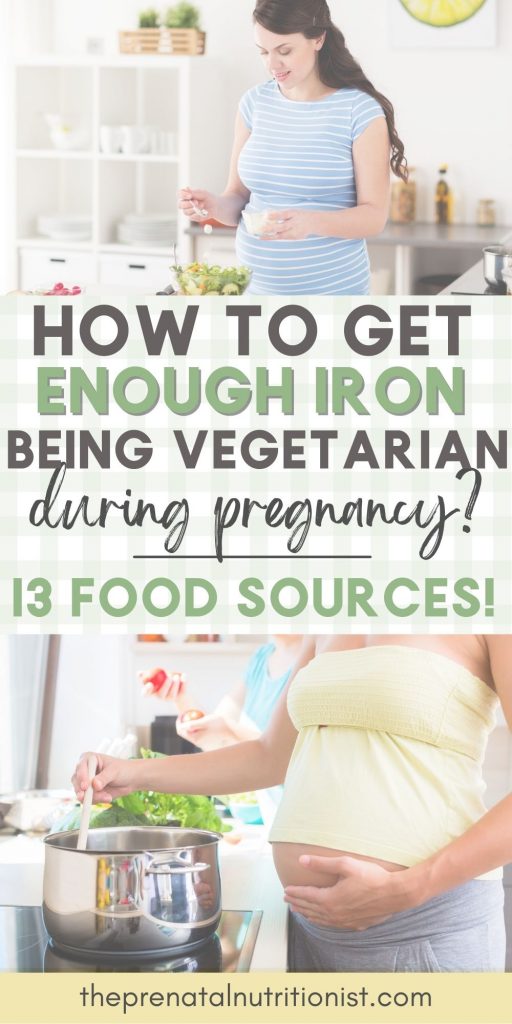
For a happy and healthy pregnancy, be sure to consume plenty of iron-rich foods.
As mentioned earlier, it’s extremely important to ensure that you’re consuming plenty of iron throughout pregnancy. From preventing anemia to directly supporting the growth and development of your baby, there are many reasons that iron should not be overlooked during pregnancy.
While iron is an important nutrient, not everyone needs to supplement with iron. This is individualized and depends on your labs, overall diet, and health history. If you’re worried about your iron intake, reach out to your provider or dietitian with any questions or concerns. We review iron, anemia, and vegetarian diets and sources during pregnancy in detail inside The Prenatal Nutrition Library.
Join today to feel confident in meeting your nutrient needs for two!
